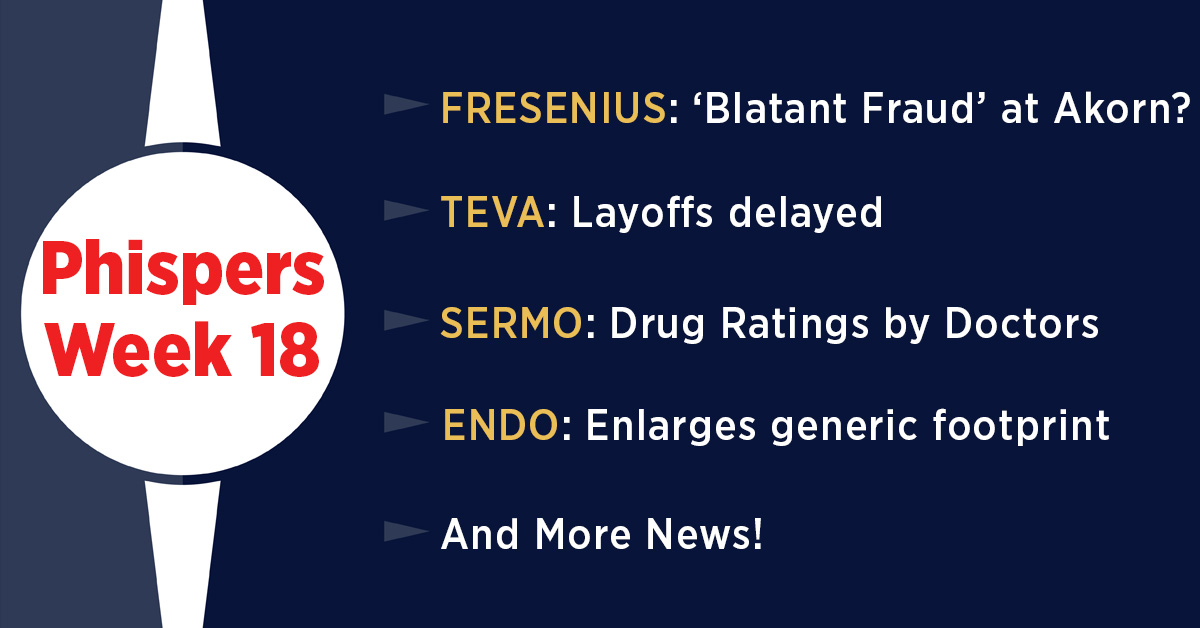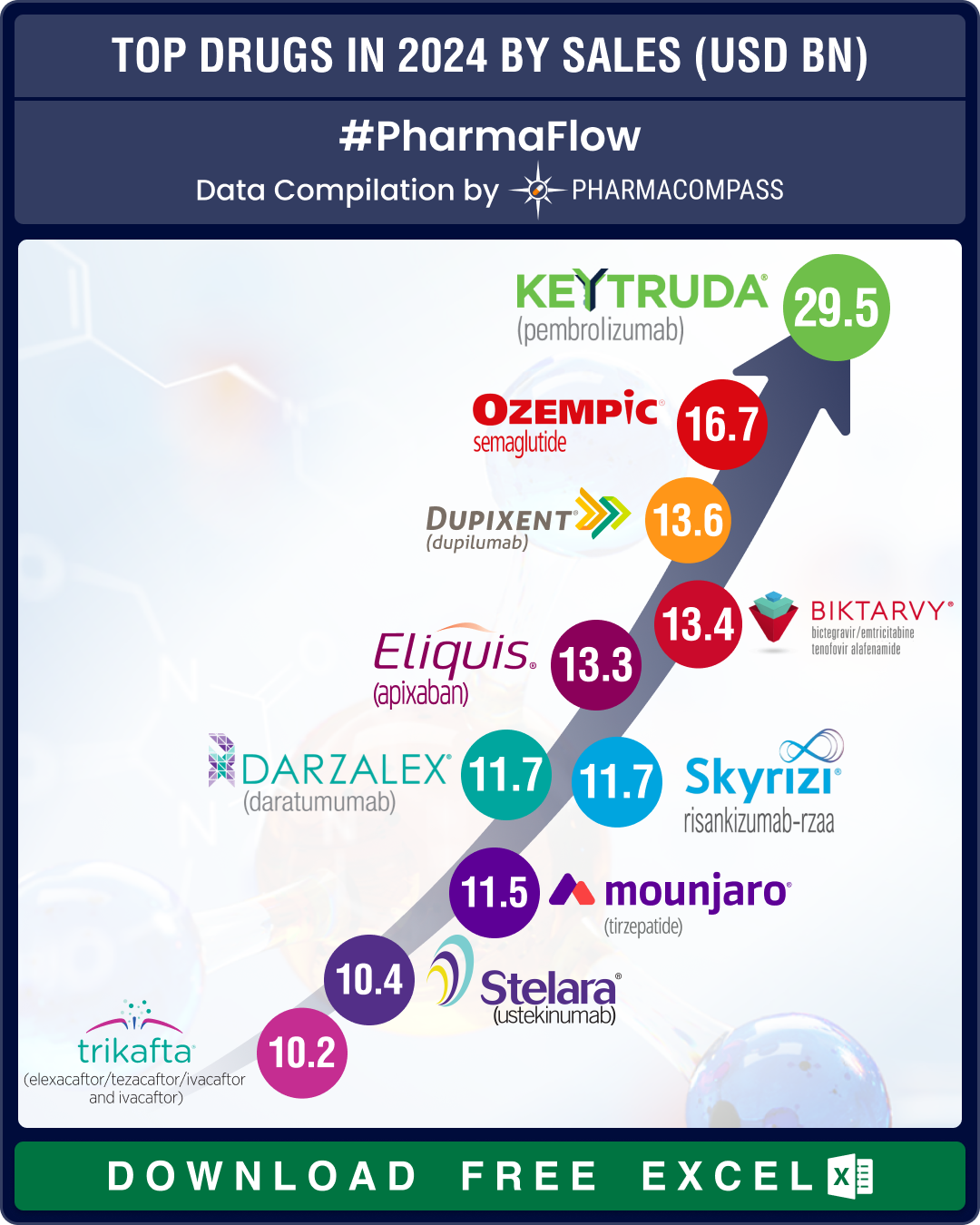
This week, Phispers has more on the Teva saga as a court in Israel ordered a delay in layoff hearings for workers at its Ashdod plant, which it plans to shut down by 2019. A debt-ridden Endo acquired Somerset Therapeutics and Wintac Limited to enlarge its generic footprint. We followed up on the Fresenius-Akorn deal that was dumped by Fresenius recently over data integrity concerns at Akorn. Meanwhile, Sermo’s drug-rating system has found widespread acceptance from physicians across the world. And the US pharma industry was served a blow by the Supreme Court as it upheld the Inter Partes Review (IPR) process.
At Teva, court
order delays layoffs at Ashdod plant; size of its board gets reduced
Responding to a petition against Israeli generic drug giant Teva Pharmaceuticals, the Beersheva District Labor Court ordered a delay in the pre-dismissal hearings for the workers at one of the plants of the company.
The petition had been filed by the Histadrut (General Federation of Labor in Israel) for an injunction and suspension of the dismissals until a buyer for Teva’s Ashdod plant is found. Super-Pharm —Israel’s largest pharmacy chain— was reportedly in talks to acquire Teva’s plant in Ashdod.
Teva plans to shut the plant by 2019. Half the workers were due to be laid off now, and half when the plant finally closes.
The judge ordered the parties to discuss the possibility of selling the plant as a going concern. A further hearing has been set for June 7.
The court also said it is “aware of Teva's difficult position, a severe crisis in which the company is having to deal with the most difficult and complex business and financial situation in its history, and which no-one disputes is real.”
Closure of Teva’s Ashdod plant is part of the company’s comprehensive streamlining plan, which was triggered by its dismal financial position and its large debt (US$ 32.5 billion at the end of 2017) incurred during the acquisition of Allergan's generic business in 2015 for US$ 40.5 billion. The plan calls for laying off 14,000 Teva employees, 1,700 of them in Israel. In January this year, Teva had postponed 140 layoffs at its Jerusalem plant until 2019.
Meanwhile, three directors are stepping down from the board at Teva and only one new director is being nominated to replace them.
According to the company, current directors Galia Maor, Gabrielle Sulzberger and Dan Suesskind will not submit their candidacy for reelection. This will leave the board with 11 members, down from the current 13.
Troubled Endo
acquires Somerset Therapeutics to enlarge generic footprint
There is news from another debt-ridden company — Endo International. The company has reached definitive agreements to acquire Somerset Therapeutics, a New Jersey-based specialty pharmaceutical company that develops and markets sterile injectable and ophthalmic drugs for the US market, and the business of its India-based affiliate Wintac Limited, which operates as Somerset Therapeutics’ contract developer and manufacturer.
Endo is paying approximately US$ 190 million to acquire Somerset Therapeutics and Wintac's business.
For Endo’s Par Sterile injectable business, these two acquisitions will secure Somerset Therapeutics’ commercial and pipeline products as well as Wintac’s manufacturing capabilities for those products.
Somerset Therapeutics’ portfolio includes eight commercial products as well as a pipeline of more than 40 products, over 25 of which have been submitted for approval to the US Food and Drug Administration (FDA). Located in Bengaluru (India), Wintac operates an FDA-inspected sterile manufacturing facility with proven sterile injectable and ophthalmic R&D capabilities.
A lot has gone wrong with Endo, which makes both branded and generic drugs. Through a spree of acquisitions led by its former CEO, the company has amassed debt of more than US$ 8 billion—five times its market capitalization. Coupled with this, Endo faces falling prices for generic medicines. Moreover, it is also embroiled in legal issues. As of November 2017, company officials had agreed to pay more than US$ 3.5 billion in settlements in more than 46,000 suits over its vaginal mesh inserts alone. According to its US Securities and Exchange Commission filings, Endo may have to shell out more to resolve all the mesh cases.
Fresenius-Akorn merger and estrangement: ‘blatant fraud’ or buyer’s remorse?
Last month, German healthcare group Fresenius abandoned its US$ 4.3 billion takeover of US generic drugmaker Akorn over data-integrity concerns.
Illinois-based Akorn filed a lawsuit in the Delaware Chancery Court asking that Fresenius be required to “fulfill its obligations” under the buyout agreement.
In a court filing made public this week, Fresenius alleged that its investigation uncovered “blatant fraud at the very top level of Akorn’s executive team, stunning evidence of blatant and pervasive data integrity violations.”
Akorn’s lawsuit acknowledges it investigated the possible submission of falsified data and fired an executive who was involved.
Fresenius claims the executive involved in the fraud wasn’t fired. Instead, he was suspended and given a consulting position with a US$ 250,000 salary. The executive, whose name is redacted from the court filings, stands to receive a payout if the merger is consummated.
The most significant instance of a data integrity issue involves an ANDA for the drug product azithromycin that was pending with the FDA, which Akorn had submitted on December 21, 2012.
A former employee, who had left Akorn in 2014, most likely falsified a data point in another chemist’s lab notebooks during the development process of the azithromycin ANDA. While he was at Akorn, the same employee may have also made entries in the lab notebooks of another chemist for five other drug products.
Upon discovering these issues, Akorn claims that it promptly terminated the executive whose failure of oversight led to the possible submission of falsified data; alerted the FDA; and withdrew the azithromycin ANDA.
Akorn lawsuit states that “azithromycin and the five other drug products in question either have never been marketed or are not currently being marketed and were never forecasted to form a material portion of Akorn’s future earnings.”
Shares of Akorn slid nearly 15 percent this week to end at US$ 12.55 per share. The stock price has been in free fall from more than US$ 30 in February after Fresenius said it was investigating data integrity at Akorn, and warned it could abandon the US$ 34-per-share deal.
The court will decide if the data-integrity concerns are truly legitimate or being blown out of proportion by Fresenius, who may be suffering from buyer’s remorse and wants to exit the deal.
The court agreed on May 2 to put Akorn’s case on fast track and has scheduled the trial to begin on July 9.
Sermo’s drug-rating system gets off to a great start
The drug-rating system launched last year by Sermo, the largest global social network for physicians, has witnessed major growth in physician ratings of pharmaceutical drugs.
Launched in May 2017, Drug Ratings is the only global peer-to-peer prescription drug review system sourced exclusively from verified licensed physicians. Drug Ratings gives physicians the ability to research, rate, and share their direct experience on the efficacy, safety, tolerability, accessibility, and adherence of specific drugs.
According to FiercePharma, the platform has 655,000 ratings on more than 4,000 medications. More than half those drugs have at least 100 reviews. And 18 of them have more than 1,000 reviews.In its inaugural year, this private and anonymous drug ratings database had been used by 70,000 doctors.
For pharma companies, the database serves as real-time feedback on experiences of physicians with a particular drug. It’s also a way to evaluate brand equity, check reactions to promotions and educational messaging, and get competitive intelligence.
Sermo’s research has found that half the doctors changed their perceptions or opinions about a drug after reading the ratings. Eighty-four percent said they believe the ratings will help improve outcomes and 77 percent said they'll use the ratings again when researching what drug to prescribe a patient.
Using Drug Ratings, Sermo’s community of global physicians has submitted more than three million data points, including ratings and comments on more than 2,100 pharmaceutical brands.
Apex court in
US serves a blow to pharma by upholding patent review process
Last week, the US Supreme Court approved a government review process by upholding the constitutionality of Inter Partes Review (IPR). The IPR is valued by high technology companies as an easy and cheap way to combat “patent trolls”.
In its ruling, the Supreme Court said IPR is legal and does not violate Article III of the US Constitution.
Supreme Court Justices ruled 7 to 2 in favor of the IPR process. The Court said the IPR review fall “squarely within the public-rights doctrine.”
However, the apex court’s ruling served a blow to the country’s pharmaceutical industry, which has opposed the IPR process since it was established in 2011. IPR is an expedited patent-challenge process that has knocked out thousands of patents. That makes it particularly worrisome to pharma companies, which want market exclusivity for their drugs to last as long as possible.
For the pharma industry in the US, it has worked against several blockbuster drugs. The industry has gone to great lengths to avoid IPR challenges. The IPR process was in the headlines recently when Allergan tried to avoid it for its dry-eye drug Restasis by granting exclusive licenses for its patent to the St. Regis Mohawk tribe, which has sovereign immunity. However, in February this year, the Patent Trial and Appeal Board of the US Patent and Trademark Office ruled the tribe cannot claim sovereign immunity to avoid an IPR for Restasis.
Under the review process, the US Patent and Trade Board (PTB) has the right to revisit whether or not patents are still eligible.
Since the IPR process was established, approximately 80 patents have been partially or totally canceled as a result of PTB’s decision, a Reuters report said.
The PharmaCompass Newsletter – Sign Up, Stay Ahead
Feedback, help us to improve. Click here
Image Credit : #Phisper Infographic by SCORR MARKETING & PharmaCompass is licensed under CC BY 2.0
“ The article is based on the information available in public and which the author believes to be true. The author is not disseminating any information, which the author believes or knows, is confidential or in conflict with the privacy of any person. The views expressed or information supplied through this article is mere opinion and observation of the author. The author does not intend to defame, insult or, cause loss or damage to anyone, in any manner, through this article.”






